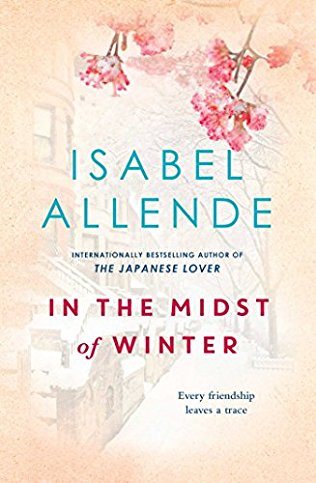The title comes from the words of French philosopher Albert Camus: ‘In the midst of winter, I finally found there was within me an invincible summer’, and it is so very apt, because the characters in this latest novel by Isabel Allende are all – in one way or another – in the midst of their own winters, and yet, together, they find a summer of reprieve.
Isabel Allende is, of course, a master storyteller, giving us epic, multi-generational family sagas that traverse geography, politics and history as well as the intricacies of the human heart. But while her earlier novels tend to be dense tomes that often require a good deal of concentration and attention to fully comprehend, I feel that her style in her more recent novels has softened somewhat, become more accessible and relatable. This is not to say that she shies away from political and historical messages, because she doesn’t – they are as strong as ever. But somehow her characters and the obstacles they must face seem more pragmatic, and her plots a little less mythical and fantastical, although they maintain the allegorical sense of embellished parables.
In the Midst of Winter (Simon & Schuster 2017) introduces us to three core characters: Richard Bowmaster, a lonely university professor in his sixties; his neighbour, Chilean academic Lucia Maraz; and Evelyn Ortega, a young woman from Guatemala. In the middle of a huge, freak snowstorm in Brooklyn, Richard and Evelyn meet by accident – literally. They are both out driving in the storm (for reasons elucidated further in the book), when they suffer a minor prang. No-one is injured, but the incident opens a Pandora’s Box of trouble, particularly for the undocumented Evelyn, and the pair – along with Lucia, who is persuaded to assist – become inextricably entwined as they spend the next three days trying to find a resolution to the problems that have presented themselves. The unusual circumstances in which they have been thrown together encourage them to gradually open up – they recount their personal histories, tell of their family backgrounds, share their griefs and their dreams. As the book progresses, we come to know each of them intimately, much as they come to know each other. Each of the three has secrets, and a complicated past which they have tried to come to terms with alone; each of them begins to suspect that perhaps together they might find grace.
Isabel Allende is a Scheherazade; her stories are compassionate, fiery, detailed, vivid, colourful and memorable. Her characters’ pasts are brought to life as if the passing years are merely moments. In both this book, and her previous novel The Japanese Lover, I found them to be particularly tender and empathetic souls, their personalities revealing human flaws and failings but also heart-warming and moving desires. The friendship and the love explored in their stories resonates as authentic, as do the moral conundrums they face. In both books, she captures the autumn years of romantic love with sensitivity and maturity. If I had to make a criticism, I found the ending of the book a little rushed; it seemed to collapse in on itself all at once, at odds with the pace of the rest of the novel – a little too neatly tied, perhaps. But on the whole I really enjoyed this story, and appreciated the modern issues (such as refugees, immigration, ‘slave labour’ and ‘the disappeared’ of South America) that it canvassed.

